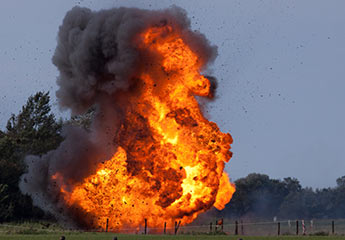The rapid developments in Power-to-X (P2X) imply that storage of highly explosive electrofuels (e.g. hydrogen) previously located in industrial plants in remote areas are entering urban neighborhoods and interact with a less experienced workforce. This leads to different and potentially increased fire and explosion hazards. Therefore, a trustworthy fire safety documentation and accurate quantification of the consequences of explosions from P2X-systems is crucial for reducing the risk for fatal accidents.
While large scale tests are expensive and time-consuming, numerical modelling provides flexible ways to assess the consequences of explosions. However, the models currently available to the market have numerous limitations and are not validated for the upcoming P2X applications to accurately assess the risk and consequences of accidents. The aim of this project is to analyze and evaluate the current models and then improve and verify them. The aim is to support the Danish national strategies for decarbonisation by improving the design process of facilities for energy production and use in P2X.
The project has been prepared in collaboration with Lund University and the University of Southeast Norway and will run over a four-year period. In addition, the project is supported by Innovation Fund Denmark.

